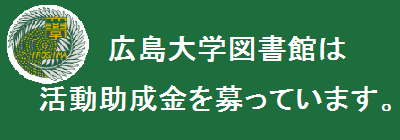During my graduate studies, I often retreated to the library stacks whenever I faced research challenges. While being surrounded by old books and journals, I had to search for particular documents, however, inevitably I came across rather unexpected titles. Time passed unnoticed as I explored these collections. Such unplanned encounters with knowledge, experienced within the unique atmosphere of the stacks, rather brought clarity to my thoughts and renewed my perspective. Though not conventionally productive, those hours remain irreplaceable to me.
Hiroshima University Library has served this institution for over 120 years, beginning as the Hiroshima Higher Normal School Library in 1902. In 1929, it became the Library of Hiroshima University of Literature and Science. The atomic bombing of 1945 destroyed the building and 190,000 of its 270,000 volumes. Rising from this devastation, the library has continued supporting education and research since the founding of the modern Hiroshima University in 1949.
Today, our five facilities - the Central, West, East, Kasumi, and Higashi-Senda Libraries—house approximately 3.4 million volumes. Notable special collections include textbooks from the Edo period to present (with 4,400 items digitized), the Peace Library and Peace Studies Collection featuring materials from Japan and abroad, and the stylus-inscribed manuscripts compiled by Professor Emeritus Yoshinori Kobayashi, among other unique holdings found nowhere else.
The library landscape has transformed dramatically with advances in digital services, including open access, electronic journals, and databases. Access to current scholarship no longer requires a physical visit. Hiroshima University Library has embraced these changes, actively supporting university education and research through electronic resources and open-access initiatives. Yet libraries actually remain important as physical places. Following the COVID-19 pandemic and the renewed appreciation for campus spaces, we have enhanced both our digital infrastructure and physical facilities. Beyond providing access to established knowledge, we are expanding services that foster active learning, including the Writing Center for Japanese and English academic writing support, and the Global Learning Center for international exchange opportunities.
We hope your time at Hiroshima University and our library will prove meaningful and memorable. Hiroshima University Library will continue supporting your learning and research in every way possible.
Yuko Kawashima
Director of the Hiroshima University Library


 Home
Home







